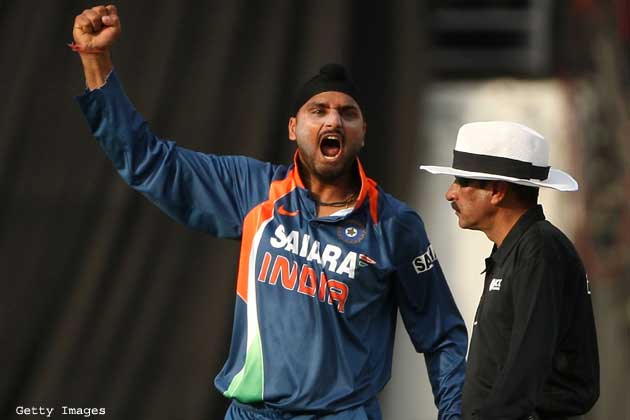
Harbhajan Singh is the enfant terrible of Indian cricket, someone who polarizes opinions of seismic proportions. For his ardent fans, he's a feisty and spirited cricketer of implacable resolve and unmatched flair with prodigious talent to back. For his detractors, he’s an over-rated player who thrives on dash and petulance rather than guile, flight and loop - the adornments of an offspinner.
Despite claiming more than 400 Test and over 250 ODI wickets, why Harbhajan's name doesn't figure in the pantheon of greats is an enigma hard to untangle. He made his ODI and Test debut in 1998 but it took him three years to gain eminence. When Australia arrived in India in 2001, they were riding high on 15 consecutive Test victories. They demolished India in the first Test of the series in Mumbai and looked set to continue their untrammeled rampage.
But then their dream run came to a screeching halt in the second Test in Kolkata. Though VVS Laxman, rightfully, walked away with kudos for his Houdini act, Harbhajan's contribution was no less as he picked up 13 wickets in match, in the process becoming the first Indian bowler to notch up a Test hat-trick. Another 15 wickets in the thrilling finale in Chennai gave Harbhajan 32 victims for the series, and India a remarkable 2-1 win.
Harbhajan received unstinted support and encouragement from then captain Sourav Ganguly and became a regular member of the Indian team. He won a string of Test matches for India on home soil but his performance outside India remained largely mediocre. His ODI record - 259 wickets in 229 matches - is fair, without being spectacular, but his economy rate of 4.30 in an era where batsmen reign supreme suggests that he contributed quite a bit to the team even in the shorter format.
But Harbhajan's reluctance to flight the ball and often bowling flat to contain batsmen rather than trying to get them out has received scathing flak from purists and connoisseurs. He's a rhythm bowler whose strength is the extra bounce which he extracts on pitches conducive to his style of bowling. Despite criticism, he remained India's No. 1 offspinner for almost a decade and was sometimes preferred over his legspin counterpart Anil Kumble.
About a year and half ago, things started to go wrong for Harbhajan. The wickets dried up, his attitude was increasingly questioned, and the arrival of Ravichandran Ashwin, coupled with shoddy form, saw him relegated to the background. His fitness too didn't stand him in good stead. In the 2011 World Cup, Harbhajan managed nine wickets in nine matches at an unflattering average of 43.33 and in the next ODI series in the Caribbean he didn't do anything of note.
He was worse in Test cricket. During the disastrous England tour last year, Harbhajan strained his abdominal muscle during the second Test at Trent Bridge and was ruled out for the rest of the series. He played two Tests in England and managed just two wickets. The Trent Bridge Test was the last international match played by Harbhajan. Even after he recovered from the injury, he found himself out of contention and was snubbed for the Test and ODI series against West Indies at home. He was not considered for the Australian tour, which prompted Harbhajan to express surprise over his relentless exclusion from the Indian squad.
He played the Vijay Hazare Trophy, India's domestic one-day tournament, last season in a bid to impress selectors but couldn't put up remarkable show. Seven wickets in eight matches - he went wicketless in three matches - is hardly a performance he can boast of.
His litany of woes continued in IPL 5. In fact, he didn't bowl his quota of four overs in most of the matches and in some crucial matches, including Mumbai's preliminary final match against Chennai Super Kings. Barring a couple of matches, Harbhajan was taken to the cleaners and looked a pale shadow of his former self. To exacerbate the matters, his on-field conduct as captain of Mumbai was severely censured. A lot of people saw his outburst against the umpire in the match against Deccan Chargers as a result of his pent-up frustration.
Besides the form and rhythm, Harbhajan has ran out of luck and steam of late. With Ashwin snapping at the heels and form (also age, to some extent) not on his side, making a comeback into the Indian side is going to be a Herculean task for the offspinner who's celebrating his 32nd birthday today. The Indian selectors will pick the team for the ODI series in Sri Lanka tomorrow and Harbhajan wouldn't mind having even the icing, if not the entire cake, as a birthday present.
For now, Happy Birthday, Harbhajan. Hope your career gets a ‘doosra’ life.





Comments
Add new comment